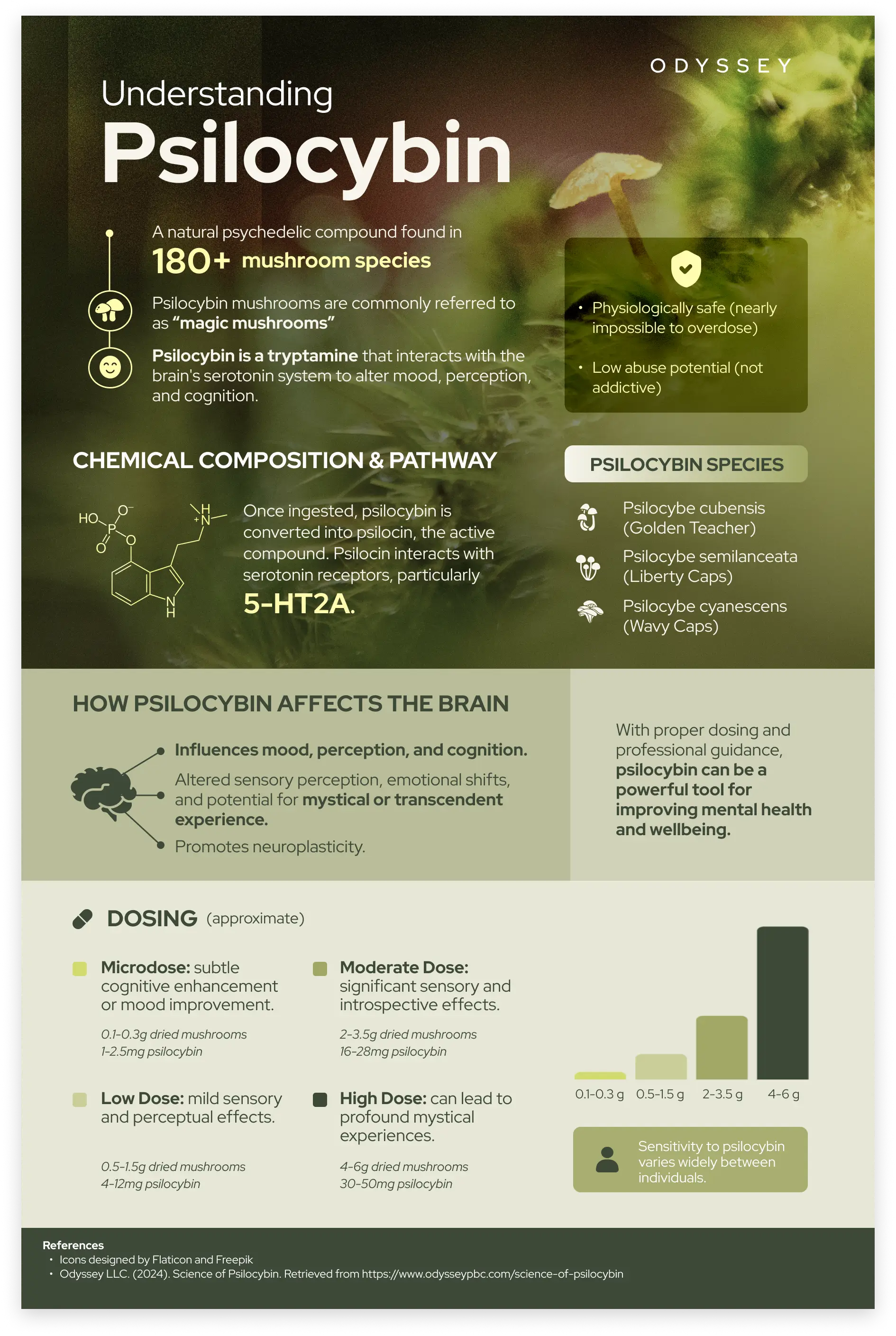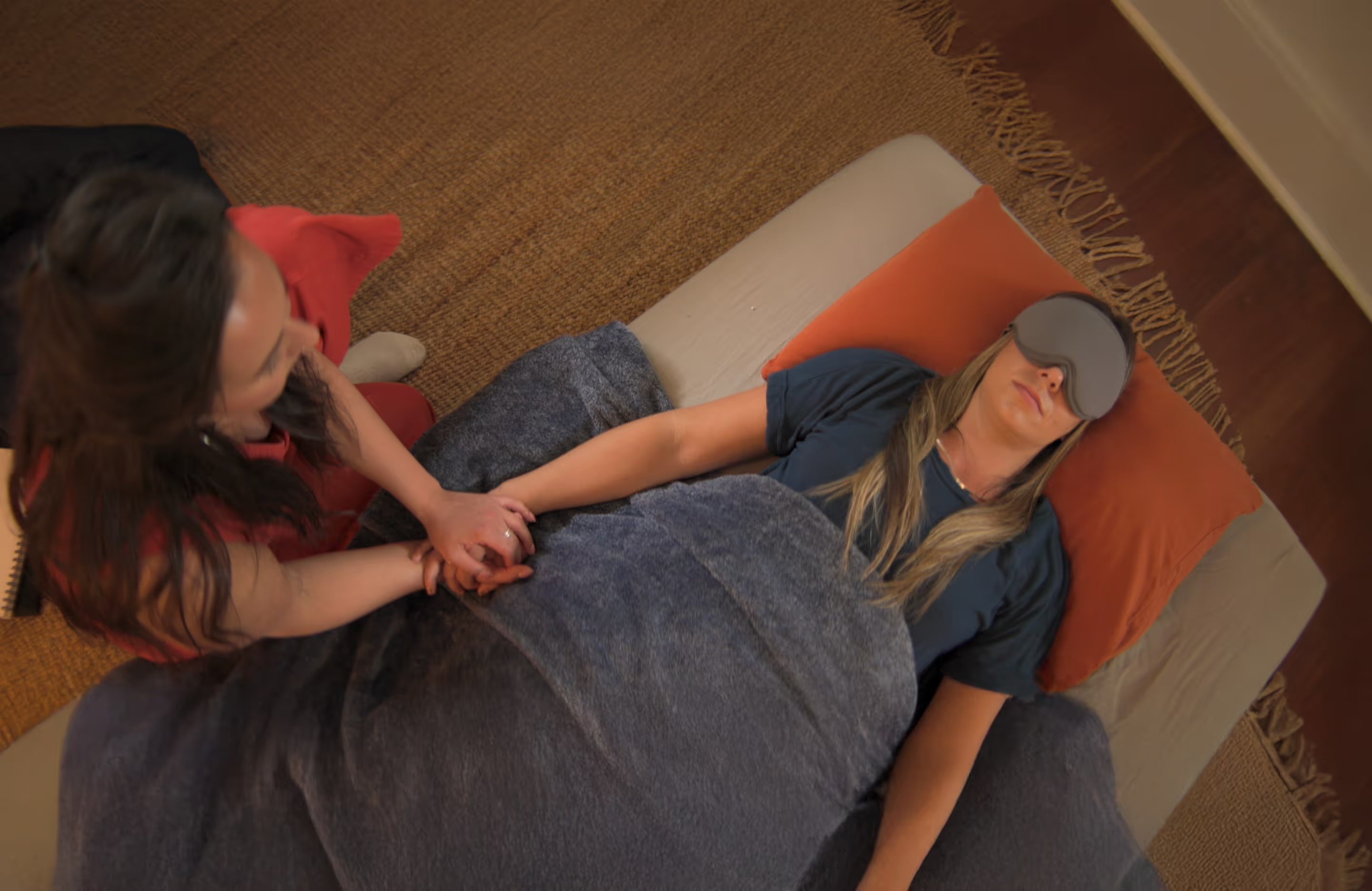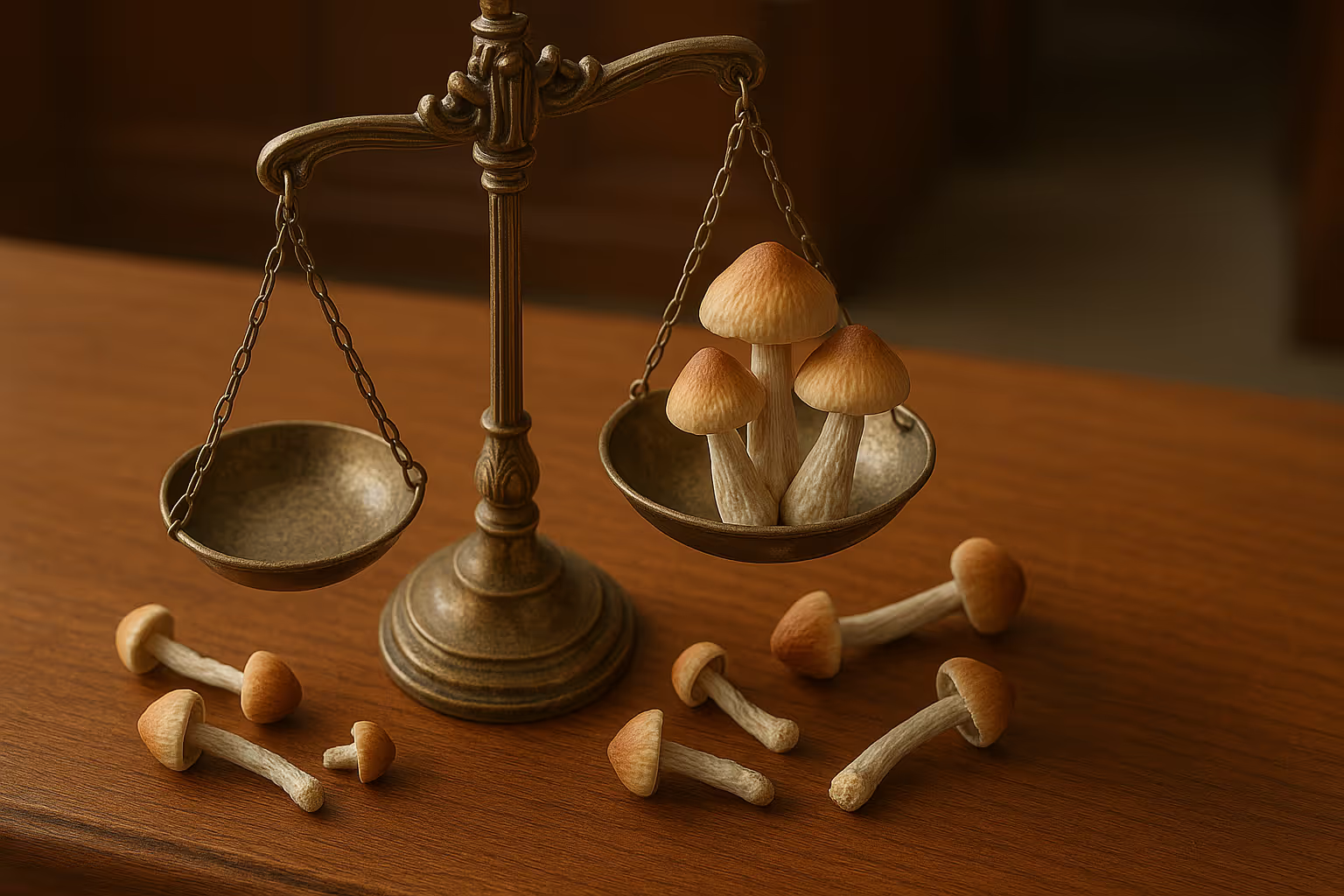Psilocybin in Illinois: Everything You Need to Know

Psilocybin, the psychoactive compound found in certain species of mushrooms, is garnering significant scientific interest for its potential therapeutic applications. In Illinois, understanding the current legal framework and latest research is crucial for medical professionals and residents interested in its possible benefits for conditions like depression, anxiety, post-traumatic stress disorder (PTSD), and addiction.
This article provides a comprehensive overview of psilocybin in Illinois, including existing laws, recent legislation changes, how to access it, and its benefits and risks.

What is Psilocybin?
Psilocybin is a naturally occurring psychedelic compound classified as a tryptamine alkaloid. It is found in over 200 species of mushrooms, commonly referred to as "magic mushrooms." Chemically, psilocybin is a prodrug that is metabolized in the human body to produce psilocin, the active substance responsible for its psychoactive effects. Psilocin primarily acts on serotonin (5-HT) receptors in the brain, leading to altered perception, mood, and cognition.
First isolated in 1958 by Swiss chemist Albert Hofmann, psilocybin has been the subject of extensive scientific research due to its potential therapeutic applications. Studies have explored its efficacy in treating conditions such as depression, anxiety, post-traumatic stress disorder (PTSD), and substance use disorders. Despite being classified as a Schedule I controlled substance in the United States, recent clinical trials have prompted renewed interest in its pharmacological properties and possible medical benefits.
Psilocybin Illinois: Legislation & Legal Status
Recent Developments
As of early 2025, Illinois is witnessing significant legislative activity concerning psilocybin, the psychoactive compound found in certain mushrooms. In January 2025, Representative La Shawn Ford introduced House Bill 1143, aiming to decriminalize and regulate psilocybin for adults aged 21 and over. This bill proposes a framework for the legal use of psilocybin, reflecting a growing recognition of its potential therapeutic benefits.
This initiative follows earlier efforts, notably the Compassionate Use and Research of Entheogens (CURE) Act, which sought to establish a regulated psilocybin therapy program in Illinois. The CURE Act aimed to create licensed service centers where adults could access psilocybin under professional supervision, targeting conditions such as depression, PTSD, and substance use disorders.
The Cure Act
In 2022, Senate Bill 3695 was pre-filed in the Illinois senate by state Rep. La Shawn Ford. Dubbed the CURE Act (Compassionate Use and Research of Entheogens Act), it proposes the financial and professional regulation of psilocybin products for accepted medical conditions like anxiety, depression, post-traumatic stress disorder (PTSD), substance disorders, and eating disorders, among others. The bill was reintroduced to the Senate Executive Committee for consideration by state Sen. Rachel Ventura in February 2024. As of September 2024, it has 11 cosponsors and is still being considered.
To establish a regulatory framework, the bill would create four types of licenses overseen by the Illinois Department of Public Health (IDPH): Psilocybin Product Manufacturing License, Service Center Operator License, Psilocybin Services Facilitator License, and Psilocybin Products Testing License. An Illinois Psilocybin Advisory Board would be established within the IDPH, comprising approximately 20 members with expertise in mental health, public health, clinical research, medicine, and mycology. This board would advise on regulations, public health standards, and industry best practices.
The implementation plan includes a two-year development, aimed at structuring psilocybin services and providing resources for for research. During this period, the Advisory Board will submit findings and recommendations to the IDPH concerning the safety and efficacy of using psilocybin to treat mental health issues. The IDPH will review these findings before making them available to the public.
The bill stipulates that those seeking psilocybin-assisted services must be at least 21 years old. Sessions are supervised by a licensed facilitator and are organized into three parts: preparation, administration, and integration. The act also imposes a 15% sales tax on psilocybin products and allows local governments to "opt out" of permitting psilocybin services through ordinances or voter decisions. While local authorities cannot create separate licensing systems or impose additional taxes, they can enact reasonable regulations on licensed establishments.
The IDPH remains responsible for developing the guidelines and licensing entities, ensuring compliance with health standards, and preventing the diversion of psilocybin to unlicensed individuals. Provisions are included to expunge records related to psilocybin possession, reducing the long-term impact of prior convictions.
As proposed legislation, the Illinois CURE Act may undergo changes before potential enactment. Stakeholders should monitor updates on regulatory frameworks, Advisory Board recommendations, and local government decisions. If enacted, the act could expand access to alternative mental health treatments, stimulate research in psychopharmacology, and influence similar legislation in other states.
To stay in the loop and get first access to psilocybin experiences in Illinois, subscribe to Odyssey’s newsletter.
Illinois House Bill 1143: A New Approach to Psilocybin Regulation
In early 2025, Illinois lawmakers introduced House Bill 1143 (HB 1143), a groundbreaking proposal aimed at decriminalizing and regulating psilocybin for adult use. The bill, sponsored by Representative La Shawn K. Ford, seeks to remove psilocybin from the state's Schedule I controlled substances list, effectively legalizing its possession and use for individuals aged 21 and older.
If passed, HB 1143 would establish the Illinois Psilocybin Advisory Board, tasked with overseeing a regulated framework for psilocybin distribution, service centers, facilitator licensing, and safety standards. The bill outlines specific guidelines for product testing, packaging, and taxation, with revenue directed toward state health and regulatory programs.
Unlike previous legislative efforts, this bill proposes a broad legalization model that includes both supervised psilocybin services and limited personal use provisions. While it faces opposition from some lawmakers concerned about public safety, supporters argue that this legislation aligns with growing research on psilocybin’s mental health benefits, particularly for depression, PTSD, and addiction treatment.
With House Bill 1143 under consideration, Illinois is at a pivotal moment in shaping the future of psilocybin access and regulation. If passed, the bill could position the state as a leader in evidence-based psychedelic policy, following the paths of Oregon and Colorado. By decriminalizing psilocybin and establishing a regulated framework for its use, Illinois has the potential to expand access to alternative mental health treatments while maintaining necessary oversight.
As discussions around psilocybin evolve, the success of this legislation will depend on public awareness, continued research, and careful implementation. Whether through supervised facilitation or personal use provisions, HB 1143 represents a shift toward recognizing the therapeutic potential of psychedelics. For now, all eyes are on Illinois lawmakers as they navigate this significant policy change.
How to Access Legal Psilocybin in Illinois in 2024
As of September 2024, it is not legal to access psilocybin in Illinois. It is classified as a Schedule I controlled substance under federal law and its use is regulated by the United States Drug Enforcement Administration (DEA). There is legislation under consideration but until then, those looking for psilocybin-assisted treatment can do so legally in Oregon (and soon in Colorado) through either group retreats or private sessions – get matched to the right experience for you.
Psilocybin Benefits & Risks
Therapeutic Applications
Psilocybin, the psychoactive compound found in certain mushroom species, has shown promise in treating various psychiatric conditions. Clinical trials have demonstrated that psilocybin-assisted therapy can significantly reduce symptoms of depression and anxiety. A study published in The New England Journal of Medicine found that psilocybin was as effective as the antidepressant escitalopram in alleviating depressive symptoms over a six-week period, with fewer negative side effects. Participants reported rapid improvements, with effects sustained for several weeks.
Read: Psilocybin Therapy for Depression

Further research indicates that psilocybin may also aid in overcoming addictions. A pilot study in the Journal of Psychopharmacology showed that psilocybin-assisted therapy facilitated smoking cessation in 80% of participants at a six-month follow-up. Similar benefits have been observed in alcohol dependence, with reduced drinking days and heavy drinking episodes reported after treatment.
There are early signals for many more potential benefits across a range of ailments. Preliminary studies suggest psilocybin can alleviate OCD symptoms – in one small-scale study, patients experienced marked symptom reduction following psilocybin administration. It has also been explored for reducing anxiety and depression in patients with life-threatening cancer diagnoses and other end-of-life care. A randomized controlled trial reported substantial and sustained decreases in anxiety and depression symptoms following a single psilocybin session. Another potential treatment area is post-traumatic stress disorder (PTSD) and related trauma disorders. Psilocybin has been shown to promote neuroplasticity—the brain's ability to reorganize and form new neural connections. This helps facilitate emotional processing, as well as the reduction of avoidance behaviors often associated with traumatic memories and maladaptive patterns.
Read: Psilocybin Therapy for Obsessive-Compulsive Disorder (OCD)
While ongoing research is required, psilocybin has shown remarkable promise as a breakthrough therapy for a number of challenges, including traditionally treatment-resistant conditions.
Potential Risks
Psilocybin use carries several potential risks. Psychological effects can include anxiety, panic reactions, paranoia, and transient psychosis, particularly in individuals with a personal or family history of mental health disorders such as schizophrenia or bipolar disorder. Physiological side effects may involve elevated heart rate and blood pressure, nausea, dizziness, and impaired coordination. In uncontrolled settings, the unpredictability of psilocybin's effects can lead to dangerous behaviors or accidents. However, in supervised settings backed by scientific guidance, the risks are majorly mitigated.
For professionally guided psilocybin experiences, book a private session or group retreat.
Read: The Safety of Psilocybin Therapy
Conclusion
The evolving landscape of psilocybin in Illinois reflects a broader shift in attitudes towards psychedelic drugs. As research continues to shed light on its potential benefits, particularly in mental health treatment, there's a growing push to make psilocybin more accessible. The Cure Act, if passed, could have a significant impact on how psilocybin is viewed and used in the state, potentially opening up new avenues to treat a variety of health conditions.
FAQs
Is psilocybin legal in Illinois?
- Psilocybin is currently not legal in Illinois. However, legislation currently being considered in the state senate aims to provide a legal framework through which individuals aged 21 and over could access supervised use of psilocybin-assisted services for therapeutic applications. Work by the Illinois Psychedelic Society, a volunteer-run nonprofit organization, and others continue to promote psychedelic literacy and advocacy in the state.
Do magic mushrooms grow in Illinois?
- Yes, psilocybin mushrooms can be found in Illinois, particularly in forested areas and woodlands where the conditions are favorable. However, it is important to note that the possession, use, or distribution of psilocybin mushrooms found in Illinois does remain illegal under state law.
Are magic mushrooms legal in Chicago?
- Psychedelic mushrooms are not legal in Chicago. The city has not decriminalized or legalized their use, although there is a growing movement advocating for psychedelic reform at both the local and state levels. Illinois psilocybin laws continue to classify the substance as illegal under federal law and there are serious consequences for its possession, sale, and use.

.svg)









.svg)